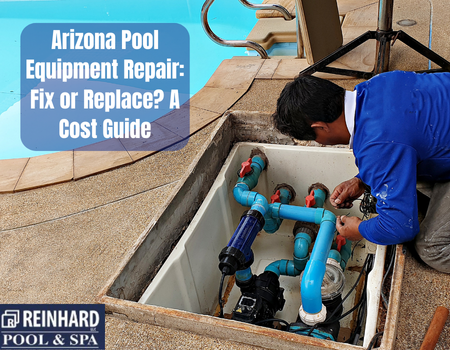Arizona’s desert climate—with its intense sun, seasonal monsoons, and high mineral content in the water—can put a lot of stress on your pool equipment. Whether you live in Phoenix, Tucson, or Lake Havasu City, chances are that at some point, you’ll face the question: Should you repair that faulty pool pump or filter… or is it finally time to replace it?
Making the right decision can save you hundreds—if not thousands—of dollars. In this guide, we’ll break down the most common pool equipment issues, what they typically cost to fix or replace, and how to know when to hold on or move on.
 Common Pool Equipment Problems in Arizona
Common Pool Equipment Problems in Arizona
Arizona’s climate accelerates wear and tear on pool systems. Here are a few components most commonly impacted:
- Pool pumps: Exposure to heat and dust can lead to overheating or motor failure.
- Filters: Sand, DE (diatomaceous earth), and cartridge filters can clog faster in hard water regions.
- Heaters: Mineral deposits from hard water and fluctuating monsoon humidity can cause corrosion.
- Salt cells/chlorinators: These wear down over time, especially with high calcium levels in the water.
- Automatic pool cleaners: These suffer from debris overload and hose cracking due to sun exposure.
Repair vs. Replace: Cost Breakdown
Let’s take a look at the cost implications for both repairing and replacing some key pieces of pool equipment.
1. Pool Pumps
- Repair: $150–$400 (for motor replacement, impeller fix, or capacitor replacement)
- Replace: $700–$1,500 (standard models); $1,500–$2,500+ for variable-speed pumps
- When to replace: If your pump is over 8 years old, makes grinding noises, or frequently trips the breaker, replacement is more cost-effective.
2. Filters
- Repair: $100–$300 (cleaning, replacing cartridges or grids, fixing leaks)
- Replace: $300–$1,000+
- When to replace: If your filter housing is cracked or the pressure won’t normalize after cleanings, it’s likely time for a new one.
3. Heaters
- Repair: $200–$500 (for pilot assembly, pressure switches, or electrical faults)
- Replace: $1,500–$3,500+
- When to replace: If you see rust, experience inconsistent heating, or it’s more than 10 years old, replacement may be more efficient and energy-saving.
4. Salt Chlorinators
- Repair: $100–$300 (cell cleaning or controller repair)
- Replace: $600–$1,200+
- When to replace: When cells corrode or performance drops significantly after 3–5 years of use.
5. Automatic Pool Cleaners
- Repair: $50–$200
- Replace: $400–$1,200+
- When to replace: Cracked hoses, broken wheels, or ineffective movement may mean replacement is the smarter option.
Key Questions to Ask Before Deciding
When evaluating whether to repair or replace, ask yourself the following:
- Age of the equipment: Most pool equipment lasts 5–10 years. If yours is nearing that range, replacement could prevent future breakdowns.
- Frequency of repairs: If you’ve had to repair the same item more than twice in the last year, it’s probably costing more over time.
- Energy efficiency: Newer equipment, like variable-speed pumps or high-efficiency heaters, can lower your monthly energy bill.
- Water quality impact: Malfunctioning equipment can lead to algae growth, unbalanced water chemistry, and faster deterioration of your pool surfaces.
- Availability of parts: For older equipment, discontinued parts may make repair impossible or expensive.
Arizona-Specific Factors
Hard water is a big factor in Arizona. High calcium levels can cause scaling in pipes, clog filters, and shorten equipment lifespan. If you haven’t installed a water softener or regularly descaled your equipment, expect more frequent repairs. Likewise, monsoon season can dump debris into your pool, overloading pumps and filters.
Pro Tip: Consider a Pool Inspection
Before you commit to a major equipment repair or upgrade, have a local pool professional inspect your setup. They can run diagnostics, test efficiency, and help you determine the most cost-effective route. Some even apply the inspection fee toward your repair or replacement.
The decision to fix or replace your pool equipment in Arizona hinges on a mix of age, performance, and cost. As a rule of thumb, if repair costs exceed 50% of the price of a new unit—and the equipment is more than halfway through its lifespan—replacement usually makes more financial sense.
Don’t wait for total failure with your pool equipment. Stay proactive, monitor performance, and work with a trusted Arizona pool technician to make informed choices that extend the life of your backyard oasis.
